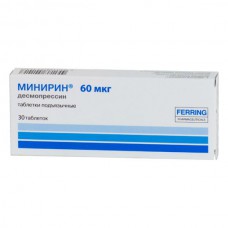Expiration date: 01/2026
Pharmachologic effect:
Activates V2-vasopressin receptors in the epithelium of the convoluted tubules and the widest part of the ascending loop of Henle, expands the pores of nephron epithelial cells and increases the reabsorption of water. It has an antidiuretic action.
Description of the pharmacological actions:
When diabetes insipidus enhances the reabsorption of water from the distal tubules of the kidneys and increases osmotic relative density of urine, which is accompanied by a decrease in the frequency of urination and decreased fluid intake.
Testimomy:
Diabetes insipidus, primary nocturnal enuresis in children (5 years and older), nocturia (nocturnal polyuria) in adults.
Contraindications:
Hypersensitivity state accompanied by reduced density relative osmotic blood plasma, including psychogenic polydipsia and habitual various etiologies fluid retention, including chronic heart failure, anuria.
Application of pregnancy and breastfeeding:
Perhaps if the expected effect of therapy outweighs the potential risk to the fetus.
Side effect:
Headache, nausea, abdominal pain, hyponatremia, weight gain, rarely - seizures.
Drug Interactions:
Indomethacin enhance antidiuretic effect and substances that increase the concentration of vasopressin in the organism (some antidepressants, chlorpromazine and carbamazepine).
Dosage and administration:
Inside. The optimal dose is adjusted individually. Central diabetes insipidus initial dose - 0.1 mg three times a day in the subsequent dose is selected depending on the response of - 0.2 to 1.2 mg / day. For most patients, the optimal dose - 0.1-0.2 mg 3 times a day.
Primary nocturnal enuresis: an initial dose - 0.2 mg at night, with the ineffectiveness of the dose was increased to 0.4 mg. The decision to continue treatment is received within 3 months of continuous therapy based on clinical data observed after discontinuation of the drug for 1 week. It should also monitor compliance with the limited regime of fluid intake.
Nocturia (nocturnal polyuria): initial dose - 0.1 mg at bedtime, after failure after 1 week increase the dose to 0.2 mg and thereafter at weekly increase - to 0.4 mg. Should be wary of the possibility of a delay in the body fluid.
Patients 65 years and older should be monitored in blood sodium levels before treatment, after 3 doses and after dose increases.
When symptoms of fluid retention and / or hyponatraemia (headache, nausea / vomiting, weight gain, and, in severe cases, convulsions), you must immediately discontinue the drug to the patient's full recovery. With the resumption of treatment should be more strictly enforce the restriction of fluid intake by the patient.
Precautionary measures:
Caution must be exercised in the appointment of children and elderly people, in conditions characterized by water-electrolyte imbalance in patients with increased intracranial pressure risk. During treatment it is necessary to control the amount of urine osmolality and urine and blood plasma. During treatment of nocturnal enuresis fluid intake for 1 hour and 8 hours after administration should be limited to a minimum (only for quenching thirst). In patients older than 65 years should control the level of sodium in the blood before treatment, after 3 doses and after the increase in dose.





